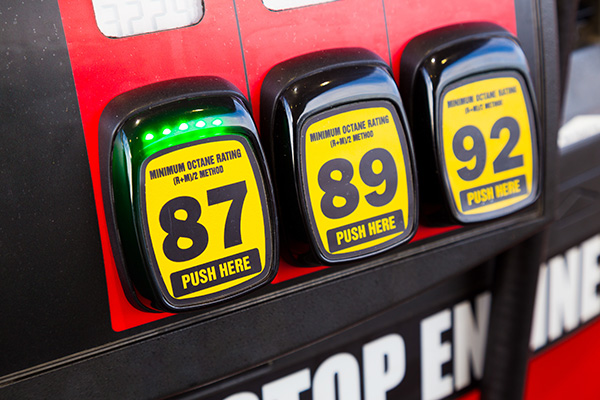
When you buy a vehicle that calls for premium gasoline, it may be tempting to fill up with regular fuel to save money. After all, gas prices fluctuate, and the difference per gallon can really add up over time. But manufacturers specify fuel grades for a reason. Gasoline affects how your engine performs, its efficiency, and even its lifespan.
The Difference Between Regular and Premium Gas
Regular gasoline has an octane rating of 87, while premium gasoline is rated at 91 or higher. Octane refers to how resistant the fuel is to knocking, which happens when the air-fuel mixture ignites prematurely in the engine’s cylinders. Knocking, or detonation, may sound like a light pinging or rattling noise, but over time it can damage pistons, valves, and other engine components.
Engines designed for premium fuel often have higher compression ratios or turbochargers. These systems generate more heat and pressure inside the cylinders. Premium gasoline, with its higher octane rating, is better suited to withstand those conditions without knocking. Using regular fuel in such an engine increases the risk of knock, which compromises both performance and longevity.
What Happens If You Use Regular Gas in a Premium Car
Occasionally, filling up with regular gas when premium is recommended may not cause immediate or catastrophic damage, but it can reduce performance. Drivers often notice sluggish acceleration, less responsive handling, or reduced fuel economy. Modern vehicles with knock sensors can sometimes adjust ignition timing to compensate, but this adjustment often results in decreased power and efficiency.
If a premium is required, not just recommended, using regular fuel consistently can lead to long-term issues. Persistent knocking can wear out engine components faster and eventually lead to costly repairs. In turbocharged engines, it may also contribute to carbon buildup that further reduces efficiency.
Manufacturer Recommendations and Warranty Concerns
Your owner’s manual is the final word on what type of gasoline you should use. Some vehicles state that premium is “recommended,” while others specify it is “required.” Ignoring these guidelines can sometimes affect warranty coverage. If engine damage occurs and it’s determined that you consistently used the wrong fuel, repairs may not be covered under warranty.
Manufacturers design their engines to operate within precise parameters, and the choice of fuel is part of that design. Following the guidelines ensures the car performs as intended and helps maintain its resale value.
Fuel Economy and Cost Over Time
Many drivers choose regular fuel to save money at the pump. While it’s true that the price per gallon is lower, the trade-off may not be worth it in the long run. If your vehicle’s efficiency decreases, you might end up buying more gallons to cover the same distance. Those savings disappear when you factor in reduced miles per gallon.
More importantly, the potential for costly repairs caused by detonation or buildup far outweighs the few cents saved per gallon. Replacing damaged pistons, turbochargers, or catalytic converters can cost thousands of dollars. Seen this way, paying extra for premium fuel becomes a small price for protecting your investment.
Situations Where Regular Gas May Be Okay
For some cars where premium is only recommended, not required, drivers can safely use regular gasoline most of the time. However, they may notice differences in performance. For example, during hot weather, towing, or high-speed highway driving, the engine may benefit from premium fuel because these conditions put extra stress on the combustion process.
If you want to save money but still protect your car, alternating between regular and premium in these cases might help. Still, the best practice is to follow the manufacturer’s exact recommendation.
Preparing for Long-Term Vehicle Health
Beyond choosing the right gasoline, maintaining your engine is just as important for long-term reliability. Regular oil changes, air filter replacements, and fuel system cleanings help keep combustion efficient. High-quality fuel additives may also help reduce carbon buildup in direct-injection engines, particularly when used in conjunction with premium gasoline.
Routine inspections of ignition components like spark plugs and coils ensure your engine burns fuel cleanly and reduces the risk of knock. Taking these extra steps, along with using premium fuel when required, ensures your car delivers the performance and efficiency it was designed for.
Protect Your Engine With the Help of Asian Imports
If you’re unsure whether your vehicle should run on regular or premium gas, or if you’ve already noticed performance issues, getting professional advice is the smart move. At Asian Imports in Las Vegas and Henderson, NV, our team specializes in servicing Asian and European vehicles that often require higher-octane fuel. We can check for signs of carbon buildup, inspect your ignition system, and guide you on the best fueling practices for your car.
Bring your vehicle to Asian Imports and keep your engine running smoothly for years to come.